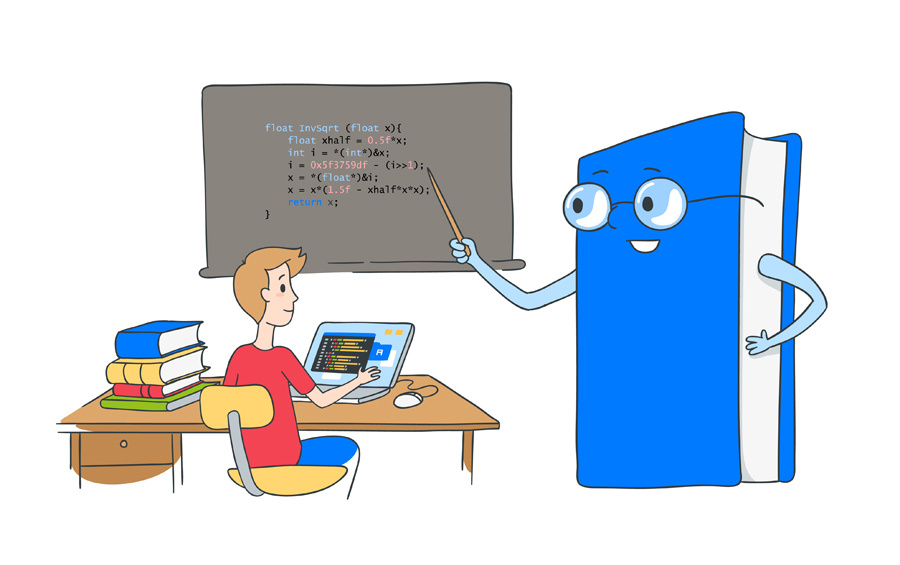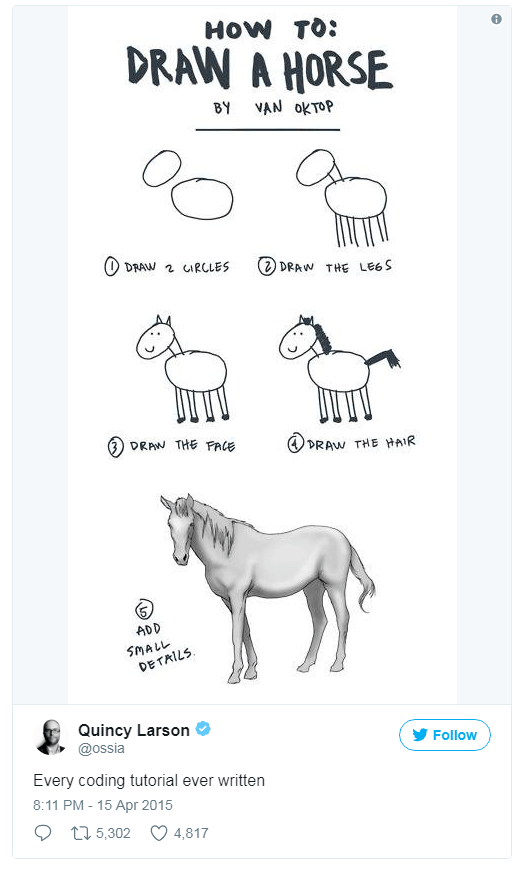How to escape from reading tutorials on programming

It was for everyone: you learn some language, you study one textbook after another - and nothing. Then you begin to doubt: “this is too difficult,” “programming is probably not for me.” I am sure this feeling is familiar to you.
I was most recently overtaken by this attack: I — the younger PHP developer who was already getting along well enough — suddenly wanted to learn a little deeper Python, especially Django.
Searching on the Internet, I found almost an ideal guide: difficult enough to be interesting, but not too overloaded.
')
It involved working on the project, and I liked its final appearance. It even seemed like it would be interesting enough to add to my ever-growing portfolio.
However, having mastered 80% of the leadership, I began to doubt. I watched the video and manually rewrote all the code. I had a great project that can be shown to others. So why did it seem to me that in all this time my skills did not increase?
Transferred to Alconost

For several weeks I worked with this manual in the evenings, and as a result I had a beautiful finished project. But even then, it still did not seem to me that I had learned enough to reproduce this project without guidance. And then how can you use it in a portfolio?
And in general, will the project be impressive in a portfolio that looks and works the same as everyone else who has done it in leadership? After all, it contains exactly the code exactly as in the author's GitHub-profile of the manual ...
Did I show at least some of my own skills, besides the ability to follow step by step instructions?
You see, learning tutorials is great, because you acquire new skills. But if we confine ourselves only to them, it will not be possible to learn that, without which one cannot become a successful developer (even a younger one). I am talking about this:
- project planning and organization;
- the right choice of tools for this business problem;
- research of own problems and search for their solution;
- solving problems that inevitably arise during development.
Guides are a good way to get started on a new area.
This is told to you by a 29-year-old former plumber who is currently working as a junior developer in a software development company. I decided to change my occupation about 12 months ago.
Like most new programmers, I began to take regular courses and then study more advanced tutorials. I focused on learning PHP (the only language I ever heard of when I started). Pretty quickly, I learned the basics of syntax and its application.
For 9 months I read enough manuals and got enough knowledge and motivation to convince a local software company to give me the opportunity to work with them. (Read more about how I convinced an employer to risk taking me and paying me for what I learn to program can be read here .)
Ultimately, the fact that I was able to show real examples of projects made helped me to offer my candidacy and get a job in such a short time. Speaking about projects, I mean OWN projects - and not what was copied from the manuals.
Guides will help to start, but then you need to do your own projects.
Don't get me wrong: manuals are great, especially for beginners when you need to learn the basics. It is clear that the quality and level of explanations in the tutorials are very different. But if you go through the guidelines one by one, this in itself does not turn you into a specialist.
You need to create your own projects. After studying the syntax and understanding the basics of applying the selected language, you need - I repeat - to start your projects without wise hints from the textbook at hand.
Usually, when I say this, they answer me: "But I have no idea what to write."
Well, no one expects you to do something cool. You most likely do not even have the necessary skills - even if there is a worthwhile idea.
Here is a list of 500 projects for which you can take - there are examples of solutions.
You can create something like a blog, for example. Yes, there are thousands of manuals, based on the creation of a blog. Perhaps in one of them you even copied the code before. Such a project may not be very impressive, but ...
Make your OWN blog. Before you take on the code, sit down and write down the necessary steps, as well as the functions that your blog will have. Understand what you need, and according to this, choose which languages and frameworks you will use. Learn how to install the necessary tools and set up your development environment yourself. And when you run into a problem or cannot figure out some function, google and select the best solution.
Do this - and you will learn 10 times more than after any manual.
Do it - and one such project in your portfolio will cost twenty projects by tutorials.
You may need something else in your portfolio to interest your employer resumes, but this depends on the complexity of the project you choose. Your code may not be the best, but this is YOUR code: you can explain each line of it and tell you how and why you made the decisions implemented in the project.
In this case, you will show that you can manage the project, work independently, acquire new knowledge as needed and create the final product. You will master several valuable skills that may interest a potential employer.
If you have been studying for a year or even a year and a half and have not yet found a job, or it seems to you that you are not ready, do not be discouraged. And do not give up. No need to think that you will have to put thousands of dollars on some "magic" courses - just start your own project, and you will be surprised at how quickly you will grow as a developer!
More and more people are getting employed immediately after freeCodeCamp - probably, this is precisely what the emphasis on training in real projects helps.
At the end of each module describes the relevant projects. Then the learner is invited to find their own solutions.
I think freeCodeCamp releases great developers precisely because no one there is holding a handle.
Share your own learning experience in the comments?
About the translator
The article is translated in Alconost.
Alconost is engaged in the localization of applications, games and websites in 68 languages. Language translators, linguistic testing, cloud platform with API, continuous localization, 24/7 project managers, any formats of string resources, translation of technical texts .
We also make advertising and training videos - for websites selling, image, advertising, training, teasers, expliners, trailers for Google Play and the App Store.
Read more: alconost.com
Source: https://habr.com/ru/post/332530/
All Articles